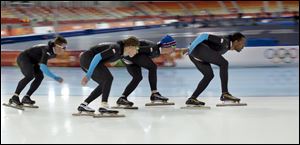
ISU looking at making speedskating more exciting
2/20/2014
U.S. speed skaters Joey Mantia, Brian Hansen, Jonathan Kuck and Shani Davis, from left to right, practice for the team pursuit at Adler Arena Skating Center during the 2014 Winter Olympics, Monday in Sochi, Russia.
SOCHI, Russia — The International Skating Union is looking to make Olympic speedskating more exciting for fans, and it’s considering things like mass start events and mixed team pursuit races.
Faced with hesitant sponsors, sometimes empty stands during the season, and monotonous races, ISU President Ottavio Cinquanta said he wants to broaden the sport’s appeal.
In an interview with The Associated Press, Cinquanta says he seeks “to maintain the tradition of speedskating with two skaters in dedicated lanes, and to have a mass start in addition.”
Mass start races would add intrigue, team tactics and a direct confrontation of skating styles in a long-distance event. It could also bring some of the push and shove elements of short track to the Olympic big oval — something likely to displease purists.
Having some of the biggest names in the sport in the thick of a new event, going shoulder to shoulder, could only help raise the profile, Cinquanta said.
“My interest is to have the big names — Sven Kramer, Jan Blokhuijzen,” he said of the two Dutch stars.
The Netherlands dominated the 2014 speedskating program with four medal sweeps among its haul. In one event, Dutch women finished first to fourth.
Dutch team manager Arie Koops endorses the addition of a mass start, saying “It would be great. Spectacular.”
Koops already envisages having semifinals where no nation can have more than one racer before the final, and where team tactics could play a part. “And it would also draw the inline skating nations in,” he said. “It has something of short track too.”
It’s been done before. At the 1932 Lake Placid Games, eight racers set off in the 10,000 final, with the pace steadily picking up before resulting in a mad sprint for the finish, with the winner stumbling and crashing across the line.
Such a race could involve a mix of long distance stars, marathon racers and skaters with an explosive finish to keep the crowd captivated for about 15 minutes.
Cinquanta is also considering a mixed team pursuit race, which would be a first for speedskating at the Olympics.
“Two men, two women together, giving the team leader the opportunity to set how racing goes,” he said. It would become an extremely tactical race because of the differences in top speeds between the men and women.
“The composition of the team is very important and would be very spicy,” Cinquanta said.
This is where Koops didn’t really agree with the ISU president’s line of thinking. Having athletes perform at anything less than their best, “you lose the essence of sports.”
“I understand you want to have mixed events, but you should not do this in a pursuit because the speed differences are such that the men cannot go full out,” he said. Other options would be to have relay baton exchanges between men and women so everyone can go at top speed.
The ISU said it will review events and performances after the Olympics, especially in light of the Dutch domination.
Cinquanta said he plans to investigate why major speedskating nations like the United States, Canada and Norway fared so badly in Sochi.
“I believe that somebody is sleeping, is not working enough,” he said.
Cinquanta acknowledges that domination by one nation is bad for the sport. He wants to provide federations financial incentives linked to performance.
He said his organization is “available to spend some money, to invest money — not to give money for free, like rain.”
The ISU could set certain targets for federation and athletes, and if they meet them, they would be rewarded with help, Chinquanta said.
“I would not ask for the moon,” he added.